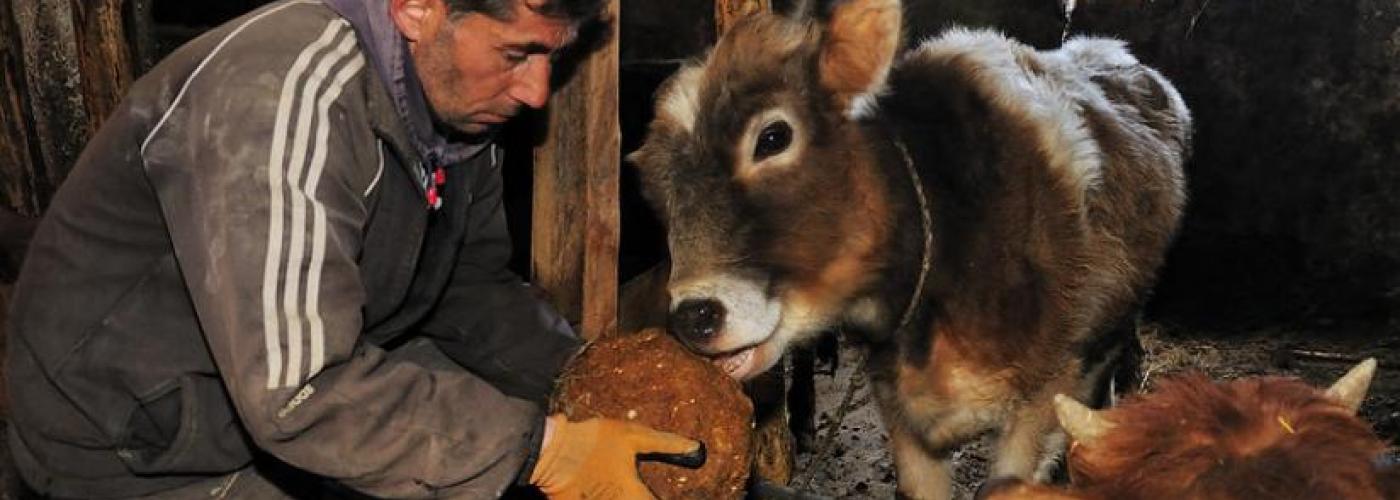Georgia’s Livestock Industry Challenges in Times of COVID-19
Image

The pandemic situation affects food systems, food security, and agricultural livelihoods, and the effect is severe for countries with relatively high levels of food insecurity like the country Georgia. It is anticipated that both the effect of the pandemic and prevention measures aiming to avoid the spreading as well as the adjoined negative effects on the overall economic performance and development will affect the vulnerable communities.
COVID-19 and its consequences on dairy and beef value chains in Georgia
In order to analyze the impact of COVID-19 on dairy and beef value chains incorporating food security concerns such as availability, access and utilization, Land O’Lakes Venture37 and Georgian Farmers’ Association (GFA) conducted a pulse survey in May 2020 of project participants in the USDA Safety and Quality Investment in Livestock (SQIL) project. The GFA Call Center surveyed 83 dairy and beef market systems actors: cattle farms; milk and beef processors; slaughterhouses; livestock inputs suppliers and service providers; wholesalers, retailers and importers of dairy and beef products.
The survey results show that during the height of the COVID-19 pandemic in Georgia, dairy and beef market systems actors face challenges that impede their operations and create obsticles in all levels of the value chains. Key agricultural inputs, including the labor force and services are still available. Imposed restrictions on transportation and movement in response to COVID-19 make it difficult to to access all inputs.
On the processing level, beef, milk and milk powder are still available for processors. At the same time, demand for dairy products increased, and half of the surveyed dairy processors increased production. This can be explained by the fact that many Georgian doctors are currently more intensively recommending eating dairy products for strenghening the imuune system during outbreak of COVID-19.
The survey results show that COVID-19 and imposed measures cause changes in distribution behavior. Particularly, farms and businesses are providing distribution of products themselves. Some of them already have identified new channels of distribution through online sales. Some created website and facebook pages, others contacted existing online platforms.
Overall, the survey results show that restrictions imposed on transportation and movement in response to COVID-19 related reasons is the primary challenge. Particulary, existing restrictions make it difficult to:
- Access agricultural inputs and services;
- Supply raw milk;
- Supply live or slaughtered animals to the processors;
- Supply processed dairy and beef products to the whole and retail chains; and
- Deliver the product to final consumers.
Detailed findings of the study is available on GFA’s webpage.
Using survey findings to support dairy and beef value chain actors in Georgia
Considering the survey results, GFA and the SQIL project identified the following actions for supporting dairy and beef market systems in Georgia:
- Increased regional representation of agricultural inputs and service providers to ensure easy access to their products and services during pandemics;
- Maintainstocks of packaging material and other supplies to maintain operations for a certain period of time;
- Create diversified distribution channels such as agrarian markets, shops, supermarkets, and online sales;
- Maintain regular communication with government on national and local levels to be informed about imposed regulations and restrictions during pandemics;
- Recruit a back-up workforce in order not to experience a labor shortage;
- Increase employer awareness about safety rules and how to behave during pandemics.
- One of the findings of the survey is that farms are not aware of necessary procedures during pandemic and they do not have any plan in response to COVID-19. Therefore, GFA decided to respond to it and developed a guideline: “How to manage farms during pandemic” informing farmers about the main activities that they have to implement during pandemic. The guideline was shared with farmers and it is also available through GFA’s webpage, and Facebook pages of GFA and SQIL project.
SQIL/GFA plans to reconduct the follow up survey during couple of months to monitor the recovering process and detect potential new challenges for the sectoral actors.
About Land O’Lakes Venture37 is a 501(c)(3) nonprofit helping communities around the world build economies by strengthening local agriculture, helping agribusinesses create jobs and linking farmers to markets. Since 1981, it has implemented over 315 integrated dairy, livestock and crop development programs in nearly 80 countries. Land O’Lakes Venture37’s long-standing affiliation with Land O’Lakes, Inc.—one of America’s largest farmer-owned cooperatives, with nearly 100 years of expertise in dairy, animal nutrition, crop inputs and agricultural insights and technologies—sets it apart. Land O’Lakes, Inc. supports Venture37 projects as part of its enterprise purpose of ‘Feeding Human Progress’ at home and around the world. www.landolakesventure37.org
About the USDA Safety and Quality Investment in Livestock (SQIL) project
The innovative, demand-driven Food for Progress SQIL project is improving food safety and quality along Georgia’s dairy and beef value chains. Throughout the project, Venture37 is partnering with Michigan State University and the Georgian Farmers’ Association, uniting agribusiness know-how with industry leading food safety acumen and deep Georgian agribusiness connections. From farm-to-fork, this project aims to reduce losses, and boost competitiveness, productivity and trade of milk and meat products.
This article was co-authored by:
Lasha Avaliani, Land O’Lakes Venture37, SQIL Georgia, Technical Director
Ketevan Gogotchuri, Georgian Farmers’ Association, SQIL Georgia, Project Manager

